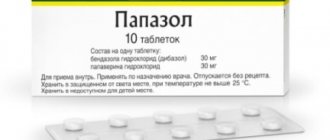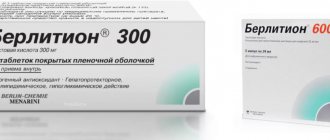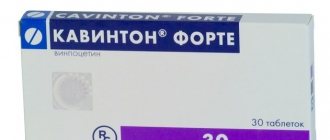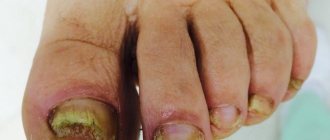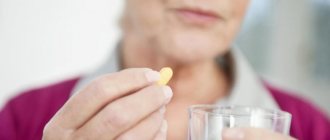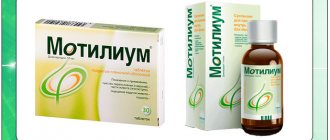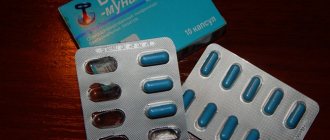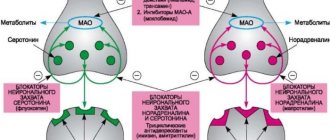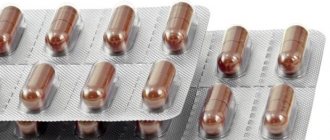Livodex is a hepatoprotector that has an immunomodulatory and choleretic effect on the human body. In addition, the drug serves to normalize lipids and cholesterol levels in the blood.
This drug can accelerate the process of cholesterol solubility in bile and promotes the removal of gallstones and prevents their re-formation. But the immunomodulatory effect of the drug is also observed.
Ursodeoxycholic acid, when entering the body, suppresses the expression of human leukocyte antigens, which are located on the membranes of liver cells and normalizes the immune properties of lymphocytes.
Release form and composition
Livodex is available in the form of tablets: round, biconvex, film-coated, brown-red in color, with a score line on one side; at the break there is a white core (10 pieces in blisters, 1, 5 or 10 blisters in a cardboard pack).
- Active ingredient – ursodeoxycholic acid: 1 tablet – 150 or 300 mg.
- Auxiliary components: sodium carboxymethyl starch, colloidal silicon dioxide, magnesium stearate, microcrystalline cellulose, povidone K-30, purified talc, sodium lauryl sulfate, starch, lactose.
Shell composition: hypromellose (E5 premium), titanium dioxide, macrogol 6000, yellow iron oxide and red iron oxide dyes.
Similar means
There are other medicines based on ursodeoxycholic acid on the pharmaceutical market. For Livodex, the analogue can be produced in the same form or in a different one. The drugs "Ursoliv", "Ursofalk", "Urdoxa", "Choludexan" and "Exhol", "Ursohol " exhibit similar pharmacological properties with a choleretic effect. The hepatoprotective agents Urdoxa and Choludexan can not only reduce the cytotoxic effect caused by bile acids, but also have an immunomodulatory effect on the body.
The drug Livodexa is available in the form of a suspension and tablets with a dose of 150 and 300 mg. The Ursosan analogue is produced in capsules with a dose of 250 mg and in liquid form. Both hepatoprotectors exhibit choleretic and cholelitholytic effects.
Pharmacological effect
Livodex has a pronounced choleretic and cholelitholytic effect, as well as immunomodulatory, hypolipidemic and hypocholesterolemic effects. The active component of the drug, ursodeoxycholic acid, has the ability to stabilize the cell membranes of hepatocytes and cholangiocytes, thereby exerting a direct cytoprotective effect.
Livodexa reduces the content of potentially toxic bile acids and slows down the process of cell death caused by them, and also stimulates the excretion of toxic acids through the intestines. In addition, the drug reduces the absorption of cholesterol in the intestine, reduces the saturation of bile with cholesterol and increases its solubility in bile. As a result, cholesterol gallstones dissolve.
As data from clinical studies indicate, the drug is an effective prophylactic agent that prevents the development of varicose veins of the esophagus. In patients with cystic fibrosis, primary biliary cirrhosis and alcoholic steatohepatitis, the drug slows down the progression of these diseases.
Pharmacodynamics and pharmacokinetics
This hepatoprotector causes stabilization of the membranes of hepatocytes and cholangiocytes , providing a direct cytoprotective effect. By acting on bile acids, the drug reduces the content of hydrophobic, toxic acids. Reduced absorption of cholesterol in the intestinal area and other biochemical effects occur due to the hypocholesterolemic effect. At the same time, cell death, which is caused by toxic bile acids, is suppressed.
Ursodeoxycholic acid reduces the ability of gastric reflux to damage cell membranes in biliary reflux esophagitis and reflux gastritis , reduces the level of cholesterol in bile, increases its solubility, reduces the lithogenic index of bile, and so on.
The immunomodulatory effect is due to inhibition of the expression of HLA antigens in the membranes of cholangiocytes and hepatocytes , normalizes the killer activity of lymphocytes . At the same time, the development of fibrosis in patients with primary biliary cirrhosis, alcoholic steatohepatitis and cystic fibrosis , and the likelihood of developing varicose veins in the esophagus is reduced.
Absorption of ursodeoxycholic acid occurs from the jejunum by passive diffusion, but from the ileum by active transport. The distribution of the active component is characterized by a high degree of binding to proteins in the plasma. It has been established that ursodeoxycholic acid is able to penetrate the placental barrier.
Inside the body, the active substance breaks down into glycine and taurine conjugates, secreted in bile. Approximately 50-70% of metabolites are excreted in bile.
The rest penetrates the colon, being bacterially broken down into components with the production of lithocholic acid. This substance is partially absorbed from the gastrointestinal tract, then biotransformed in the liver into sulfolitocholyl taurine sulfolitocholylglycine conjugates, and then excreted from the body.
Contraindications
It is not recommended to use Livodex in patients suffering from:
- gallstones;
- non-functioning gallbladder;
- liver cirrhosis in the stage of decompensation;
- increased individual sensitivity to its components;
- severe dysfunction of the kidneys, liver and pancreas;
- lactose intolerance, lactase deficiency, glucose-galactose malabsorption;
- acute inflammatory diseases of the gallbladder, intestines and bile ducts.
The drug is also prohibited in children under 3 years of age. Livodex is prescribed with caution to young patients 3-4 years old, as it is difficult for them to swallow tablets.
Indications and contraindications
The drug Livodex is prescribed to eliminate the symptoms of primary biliary cirrhosis and gastrophageal reflux disease. The medicine is taken for hepatitis of various etiologies, liver dystrophy, cholangitis, cystic fibrosis, steatohepatitis and blockage of the biliary tract.
How to take Livodex in the presence of cholesterol formations in the active gallbladder? Instructions for use and dosage are selected by the doctor for each patient individually.
Livodex 300 mg is contraindicated for:
- Calcium stones in the gall bladder
- Hypersensitivity to UDCA
- Non-functioning gallbladder
- Childhood
- Lactase deficiency
- Disorders of parenchymal organs
- Inflammation of the intestines, bile ducts or bladder
- Liver fibrosis.
Use during pregnancy and lactation
The use of ursodeoxycholic acid during pregnancy is possible only when the expected benefit to the mother outweighs the potential risk to the fetus (there have been no adequate, strictly controlled studies of the use of ursodeoxycholic acid in pregnant women).
There are currently no data on the excretion of ursodeoxycholic acid in breast milk. If it is necessary to use ursodeoxycholic acid during lactation, the issue of stopping breastfeeding should be decided.
Dosage and method of administration
The instructions for use indicate: Livodex tablets are taken orally, without chewing, with a sufficient amount of water. The tablet can be divided in half.
- To dissolve cholesterol gallstones, the average daily dose of Livodex is 10 mg/kg (up to 12-15 mg/kg). The drug is taken in the evening, before going to bed. The course of treatment is 6-12 months.
- To prevent the re-formation of stones, it is recommended to take the drug for several more months after the stones have dissolved.
- Symptomatic treatment of primary biliary cirrhosis: average daily dose - 10-15 mg/kg (if necessary - up to 20 mg/kg) from 6 months to several years. The drug is taken with food, with a sufficient amount of liquid.
- For biliary reflux gastritis and reflux esophagitis, the dose is 10 mg/kg/day - 1 time/day before bedtime. The course of treatment is from 10-14 days to 6 months, if necessary - up to 2 years.
- For chronic hepatitis of various origins (toxic, medicinal, etc.), primary non-alcoholic steatohepatitis, alcoholic liver disease, the average daily dose is 10-15 mg/kg body weight in 2-3 doses. The duration of therapy is 6-12 months or more.
- For primary sclerosing cholangitis, cystic fibrosis (cystic fibrosis), the average daily dose is 12-15 mg/kg (if necessary, up to 20-30 mg/kg/day) in 2-3 doses. The duration of therapy ranges from 6 months to several years.
- For biliary dyskinesia, the average daily dose is 10 mg/kg in 2 divided doses for 2 weeks to 2 months. If necessary, it is recommended to repeat the course of treatment.
The dose for children is determined individually at the rate of 10-20 mg/kg per day.
Calculation of the daily number of Livodex tablets depending on the patient’s weight when prescribing a dose of 10 mg/kg per day (for Livodex 150 mg/ Livodex 300 mg):
- 34-50 kg – 3 tablets/1.5 tablets;
- 51-65 kg – 4 tablets/2 tablets;
- 66-85 kg – 5 tablets/2.5 tablets;
- 86-100 kg – 6 tablets/3 tablets;
- >100 kg – 7 tab./ 4 tab.
Calculation of the daily number of Livodex tablets depending on the patient’s weight when prescribing a dose of 15 mg/kg per day (for Livodex 150 mg/ Livodex 300 mg):
- 34-50 kg – 5 tablets/2 tablets;
- 51-65 kg – 6 tablets/3 tablets;
- 66-85 kg – 7 tablets / 3.5 tablets;
- 86-100 kg – 8 tablets / 4.5 tablets;
- >100 kg – 9 tablets / 6 tablets
Calculation of the daily number of Livodex 300 mg tablets depending on the patient’s weight when prescribing a dose of 20 mg/kg:
- 34-50 kg – 3 tablets;
- 51-65 kg – 4 tablets;
- 66-85 kg – 5 tablets;
- 86-100 kg – 6 tablets;
- >100 kg – 7 tablets.
Calculation of the daily number of Livodex 300 mg tablets depending on the patient’s weight when prescribing a dose of 30 mg/kg:
- 34-50 kg – 5 tablets;
- 51-65 kg – 6 tablets;
- 66-85 kg – 7 tablets;
- 86-100 kg – 8 tablets;
- >100 kg – 9 tablets.
Indications for use of the drug
Livodex is prescribed:
- with primary biliary cirrhosis, if there are no signs of decompensation;
- for dissolving small or medium-sized cholesterol stones, with a functioning gallbladder;
- for biliary reflux esophagitis and reflux gastritis ;
- alcoholic liver disease;
- chronic hepatitis of various origins;
- non-alcoholic steatohepatitis;
- biliary dyskinesia
- primary sclerosing cholangitis ;
- cystic fibrosis or cystic fibrosis .
Side effects
Taking Livodex tablets in some cases leads to undesirable consequences associated with the digestive system. These include:
- Nausea;
- Diarrhea;
- Increased gallstones;
- Sharp abdominal pain; Increased activity of hepatocytes and improved functioning of liver enzymes.
During the treatment of biliary cirrhosis, dysfunction of the liver sometimes occurs, which occurs due to abrupt cessation of the drug.
Analogues of Livodex tablets
Livodex has the following analogues - Ursosan and Grinterol. Other cheap substitutes for the drug are Eschol and Choludexan.
Ursosan
Manufacturer – PRO.MED.CS, Czech Republic
Price – from 800 rubles
Description – capsules take gallstone disease and liver dysfunction
Pros – really dissolves stones, wide spectrum of action, safety
Disadvantages - long-term use, can cause diarrhea and pain in the gallbladder.
Which is better Ursosan or Livodex? The drugs contain the same active substance. Therefore, they have a similar therapeutic effect.
Grinterol
Manufacturer – JSC Grindeks, Latvia
Price – from 886 rubles
Description – capsules have hepatoprotective, choleretic, cholelitholytic properties
Pros - effectiveness, reasonable price, eliminates bile stagnation, lowers cholesterol levels
Disadvantages – there are contraindications and unwanted reactions.
Eskhol
Manufacturer – Kanonpharma, Russia
Price – from 123 rubles
Description – tablets and capsules are prescribed for the treatment of cystic fibrosis, dyskinesia, cholangitis, steohepatitis, cirrhosis
Pros – reduces bilirubin and aminotransferase content, cost, quick action
Disadvantages - sometimes intolerance to the drug occurs, and sometimes adverse reactions occur.
Choludexan
Manufacturer – Sigma, Egypt
Price – from 133 rubles
Description – capsules normalize the functioning of the liver, gastrointestinal tract and gall bladder
Pros – good alternative to surgery, price, quality
Cons – often causes diarrhea, there are contraindications.
special instructions
Before you start using the drug, read the special instructions:
- When the drug is used to dissolve gallstones, it is necessary to monitor the activity of hepatic transaminases, alkaline phosphatase, gamma-glutamyltransferase and bilirubin concentration. If elevated levels persist, the drug should be stopped.
- In order for the dissolution of stones using Livodex to be successful, it is necessary that their size does not exceed 15-20 mm, they are purely cholesterol, fill the gallbladder by no more than half, and the bile ducts fully retain their function.
- When, after 6-12 months of taking the drug, partial dissolution of the stones has not occurred, it is unlikely that further treatment will be effective.
- The discovery of a non-visualized gallbladder during an ultrasound is evidence that complete dissolution of the stones has not occurred, and drug therapy must be discontinued.
- The drug must be discontinued in cases of impaired contractility of the gallbladder, calcification of gallstones or frequent attacks of biliary colic.
In the first 3 months of Livodex therapy, cholecystography should be performed every 28 days, then once every 3 months. During the first year of treatment, it is necessary to monitor the effectiveness of therapy every six months using ultrasound (ultrasound). The medication should be continued for at least 3 months after the stones have completely dissolved in order to promote the dissolution of remnants of stones that are too small to be detected.
Drug interactions
The drug should not be used simultaneously with antacids containing aluminum and ion exchange resins, since these drugs may interfere with the absorption of ursodeoxycholic acid. When used concomitantly, lipid-lowering drugs, estrogens, neomycin or gestagens (oral contraceptives) increase the saturation of bile with cholesterol and may reduce the ability of ursodeoxycholic acid to dissolve cholesterol gallstones.
Ursodeoxycholic acid may increase the absorption of cyclosporine from the intestine, which requires monitoring the concentration of cyclosporine in the blood and, if necessary, adjusting its dosage regimen.
How to use
The instructions recommend taking the medicine “Livodex” once a day. Reviews from experts advise swallowing the tablet whole without chewing and washing it down with a large volume of clean water so as not to harm the stomach.
When dissolving gallstones and treating liver diseases, a twice daily dose of 100 mg is recommended. The duration of treatment ranges from 5 months to 1 year. Then there should be a short break, after which repeated therapy is carried out until the stones completely disappear.
To treat reflux gastritis, take 250 mg of Livodex once a day for 10-14 days. Reviews from people indicate that severe stages of this disease can be treated for about 5 months.
In liquid dosage form, the medication is prescribed to patients with low weight. Usually, for body weight less than 30 kg, a suspension is prescribed.
It is important to know which medications can and cannot be combined with Livodex. Ursodeoxycholic acid is not used with antacids that contain aluminum or ion exchange resin, due to impaired absorption.
The simultaneous use of lipid-lowering drugs, estrogens, neomycin or gestagen in the form of oral contraceptives increases the saturation of bile contents with cholesterol and reduces the ability of ursodeoxycholic acid to destroy bile formations.
The active component of the drug increases the digestibility of cyclospora from the intestinal contents, which requires monitoring its content in the blood plasma and revising the dosage.
Reviews
We have selected some reviews from people who have taken Livodex:
- Marina. My husband was diagnosed with the first signs of cirrhosis. This was not a surprise - he drank a lot and often. This forced him to stop drinking alcohol and begin treatment. He has been taking Livodex tablets for a year now. So far, all indicators are slowly but surely moving towards normal, but the process of fibrosis is difficult to stop. You will have to be treated with medication for at least another year.
- Svetlana. It was just agony when Campi was dissolved in my gall bladder with the help of Livodex. Lazar didn’t take them, so I had to take pills, and after them I feel sick constantly, incessantly, regardless of whether I ate or didn’t eat, and it completely drives me crazy. So for 4 months I felt sick and almost went crazy. And then somehow everything suddenly stopped and it turned out that my stones had dissolved!
- Vladimir. A young doctor recommended Livodex to me and said so, forget about all the drugs and buy it. You know, the price both made me happy and made me doubt, but after just a couple of months of taking the drug, I recommend it to everyone who experiences liver problems and also recommend it for prevention.
Reviews of Livodex
As a rule, discussions of this drug are found on specialized websites. At the same time, users often share information regarding reception features and ask various questions.
For example, some patients doubt the correct dosage. The fact is that the instructions indicate that you should take the tablets in the evening, but the doctor prescribed 2 tablets. However, as reviews of Livodex 300 mg show, only this dosage is one tablet, and if the drug is 150 mg, then accordingly you need to take 2 tablets in the evening.
In addition, there are reports when treatment with other drugs was replaced by Livodexa due to lack of effectiveness.
Patients undergoing treatment should understand that taking these tablets alone will not help in completely restoring the liver or clearing the gallbladder of stones. Complex therapy is usually carried out in combination with other drugs and treatment methods. Only this approach will fully optimize the state of the human digestive system.
You should also follow a careful diet.
Storage conditions and shelf life
The shelf life of Livodex tablets is 2 years from the date of their manufacture. The drug should be stored in a dark, dry place, out of reach of children, at an air temperature no higher than +25º C.
Livodex tablets (150 and 300 mg): instructions for use - tips and recommendations on News4Health.ru
Life in the modern world is replete with many factors that negatively affect human health. The main ones are poor ecology, questionable quality of food, contaminated drinking water, poor quality medical care, as well as stressful situations and bad habits. Therefore, it is so important to pay attention to regular healing of the body using various methods and means. Be sure to consult a specialist so as not to harm your health!
Analogs
In pharmacies you can find both structural analogues of Livodex and drugs belonging to the same pharmacological group, that is, hepatoprotective drugs.
Structural analogues include:
- Ursoliv.
- Exhol.
- Ursosan.
- Ursodes.
- Choludexan.
- Grinterol.
- Ursoliv.
- Ursoprim and others.
Among the hepatoprotector analogues we can highlight:
- Gepabene.
- Heptor.
- Karsil.
- Methionine.
- Legal.
- Bonjigar.
- Antraliv.
- Hepatosan.
- Silimar.
- Essliver.
- Phosphogliv and others.


